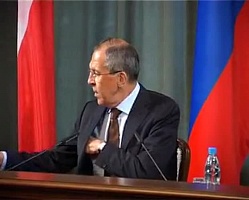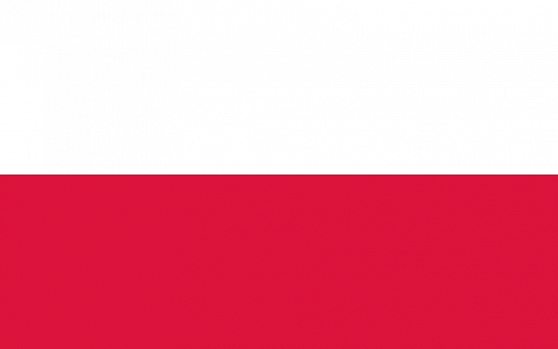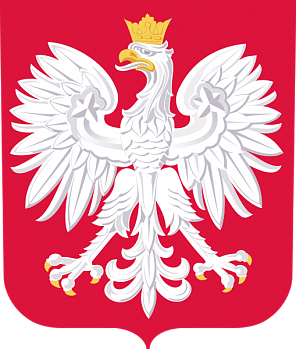 the Republic of Poland
the Republic of Poland
Transcript of Remarks and Response to Media Questions by Russian Minister of Foreign Affairs Sergey Lavrov at Joint Press Conference Following Talks with Polish Minister of Foreign Affairs Radosław Sikorski and the Fifth Meeting of the Committee for Russian-Polish Cooperation Strategy, Moscow, May 6, 2009
Esteemed colleagues,
My counterpart Mr. Sikorski and I have held frank and truly businesslike talks both in a "narrow" composition and within the framework of a meeting of the Committee for Russian-Polish Cooperation Strategy.
Both sides noted the mutual interest in a substantive dialogue and the creation of a favorable political climate for developing bilateral relations. There was emphasized the mutual willingness to accommodate each other and to jointly work towards implementing the accords reached during Polish Prime Minister Donald Tusk's visit to Moscow in February 2008 and during the meeting between the heads of government of our countries in Davos in January this year.
The Russian-Polish dialogue encompasses quite a few themes, primarily bilateral, and regional and international as well. Today we thoroughly discussed some of them, particularly in the context of Russia's initiatives in the energy sphere and in the realm of military-political security on the European continent.
The consideration of the bilateral agenda passed with regard for the fact that Mr. Sikorski and I are the co-chairs of the Committee for Russian-Polish Cooperation Strategy, which resumed its work today after a four-year hiatus. We examined ten large thematic blocks that characterize the scale of ties between Russia and Poland and we laid emphasis on the spheres where there is a good basis for onward movement. This concerns the economy in the first place. Poland is one of our leading partners in the European Union. Trade last year reached a record level of over $27 billion (a rise of nearly 52%). It is possible that the world crisis will bring its corrections to these statistics, but we did manage to lay a solid basis. We are gratified by the outcome of the second meeting of the Russian-Polish Intergovernmental Commission on Economic Cooperation held in Warsaw in March this year.
Ties are dynamically evolving in the fields of culture and science. The Polish Cultural Season was held in Russia last year, the Wisla Polish Film Festival took place in Moscow in April, and joint work is under way on the organization of the Second International Zielona Gora Russian Song Festival.
The meeting of the Committee for Russian-Polish Cooperation Strategy discussed the promotion of interregional ties. We stand for expanding the geography of these contacts. We backed up the initiative to establish a new mechanism of collaboration between our countries, the Regions' Forum, and to hold a Russian-Polish conference on interregional cooperation in Moscow in September under the patronage of the chairmen of the upper houses of the parliaments of Russia and Poland.
We attach great significance to the realization of the interests of our citizens, including the question of freedom of movement. In particular, we have suggested concluding an agreement establishing a simplified regime for trips of residents of the border territories. On the Polish side's initiative we will work in conjunction with the European Union and Lithuania to ensure that the accords concerning the Kaliningrad Region do not encroach upon the interests of the residents of this Russian region. The preparation of an intergovernmental agreement on navigation in the Kaliningrad (Vistula) Bay is in the concluding stage. We see considerable possibilities for developing relations in the fields of tourism, environmental protection and youth exchanges.
Another important platform of Russian-Polish dialogue is the Public Forum. Although a full-format meeting of the Forum will take in Moscow from May 12-14, Sikorski and I deemed it necessary to meet its representatives and to discuss the prospects for developing bilateral relations from the viewpoint of the participation of the civil societies of the two countries in this process.
The so called "difficult affairs," stemming from the history of the two countries and peoples, were touched upon. We agreed that the historical problems should not be projected onto the present and future of our relations, and even less so – weigh them down. We hope that the upcoming meeting of the bilateral Group for Difficult Affairs in Cracow at the end of May will take another step toward removing such topics from political circulation.
I am glad to report that there continues the practice of bestowing the joint diplomas of the Russian and Polish Foreign Ministers "For outstanding services in the promotion of understanding and rapprochement between Russian and Polish societies" upon Russian and Polish citizens. Barbara Brylska, a Polish actress well known in Russia, and Victor Erofeyev, a Russian writer popular in Poland, became the laureates of the prize this year.
In conclusion I would like to express my satisfaction with the work done by us today. I think that the potential of Russian-Polish cooperation is very huge. It is the task of the politicians to create conditions for the release of this potential.
Question: Was the visit of Prime Minister Vladimir Putin to Poland this upcoming September confirmed?
Foreign Minister Lavrov: The invitation to Prime Minister Putin came from Prime Minister Tusk. They discussed this question over the phone. The invitation implies the participation of Putin in the planned September 1 ceremony on the occasion of the anniversary of the start of World War Two. Also discussed was the possibility to hold bilateral talks in parallel with this event. Today we discussed the course of the consideration of this invitation. We expect that after the clarification of organizational and content parameters we will be able to express ourselves on this theme more concretely.
Question: Are the expulsion of the Russian diplomats from Brussels and the holding of a NATO exercise in Georgia interconnected? Do you think Georgia is a suitable site for NATO's exercise a day after the military mutiny in that country? Will this theme be touched on at the upcoming meeting with Hilary Clinton?
Foreign Minister Lavrov: Undoubtedly, we will discuss the entire range of our relations within the Russia-NATO Council during my visit to Washington. We will pay special attention to the still-lingering alarming situation in Transcaucasia, primarily because of the provocative actions that are periodically undertaken by the Georgian leadership. I can give as the latest example yesterday's refusal by Tbilisi to allow Aviacon Zitotrans planes on supply flights for Swedish troops within the International Security Assistance Force in Afghanistan to fly over Georgian territory. Those flights had been made repeatedly. Now a ridiculous pretext has been put forward that there is no consent of the Swedish side.
Of course, everything is interconnected, including the exercise. At this moment we have yet another confirmation of the fact that the policy of conniving at the Tbilisi regime in the end harms the interests of NATO himself, since it is the alliance's troops that form the backbone of the International Security Assistance Force in Afghanistan.
As to the expulsion of the two Russian diplomats whose accreditation to NATO's headquarters has been revoked, I see no essential link in this regard. But all of this fits naturally into the groundwork of the actions directed at preventing resumption of normal cooperation in the framework of the Russia-NATO Council. Of course we were forced to respond. Today we declared revocation of the accreditation of two employees of NATO's Information Office in Moscow. This is a logical response. Our NATO partners, at least those who initiated the expulsion of the two Russian diplomats, could not have expected anything different from us.
Our principled line is that we want a normal, mutually advantageous and mutually respectful partnership with NATO. We want the normal, pragmatic and mutually respectful work of the Russia-NATO Council based on the principles that were laid down when establishing this important mechanism. In the first place, I mean the principle of refusal to secure oneself at others' expense. It is those wanting to bury this principle and ensure security in Europe not through dialogue, but through unilateral decisions that stand behind the attempts to prevent normalization of these relations, including by the kind of provocations we are now talking about.
Question: What is the attitude of Russia to the EU's Eastern Partnership program now being deployed? Have today's talks led to a greater clarification of the positions?
Foreign Minister Lavrov: We discussed this question today. Sincerely and frankly we shared with the Polish colleagues our assessments of certain statements that came from Brussels in relation to the preparation of an Eastern Partnership summit. We expressed our concern over the fact that, judging by some of those statements, some people are not averse to placing the countries being invited to participate in the Eastern Partnership before the choice of you're either with Russia or with the European Union. We've appreciated the explanations that Sikorski gave us today, assuring us that this is not in the plans of Poland as an initiator of the Eastern Partnership program. According to him, Poland is interested in seeing this program develop fully in line with the accords reached in the past between Russia and the European Union not to allow for collision between the integrative processes developing under the aegis of the EU and those in the post-Soviet space. We accept these explanations with satisfaction and hope that the Eastern Partnership will evolve in just this way and that it will not take the path which the European Commission used during the preparation of the recent conference on Ukraine's gas transit system, when attempts were made to deal with the questions directly concerning the Russian Federation without our participation. I repeat the answer which we have today received from our Polish colleagues suits us. We will count on just this kind of implementation of this initiative. Implementation that will take into account the interests of all those who one way or another cooperate in our common European space, and the common interest in our establishing a common space in all fields, including the economy, energy and movement of capital, services and labor, rather than trying to build dividing lines. We have heard precisely such assurances today and we appreciate it.
May 6, 2009






